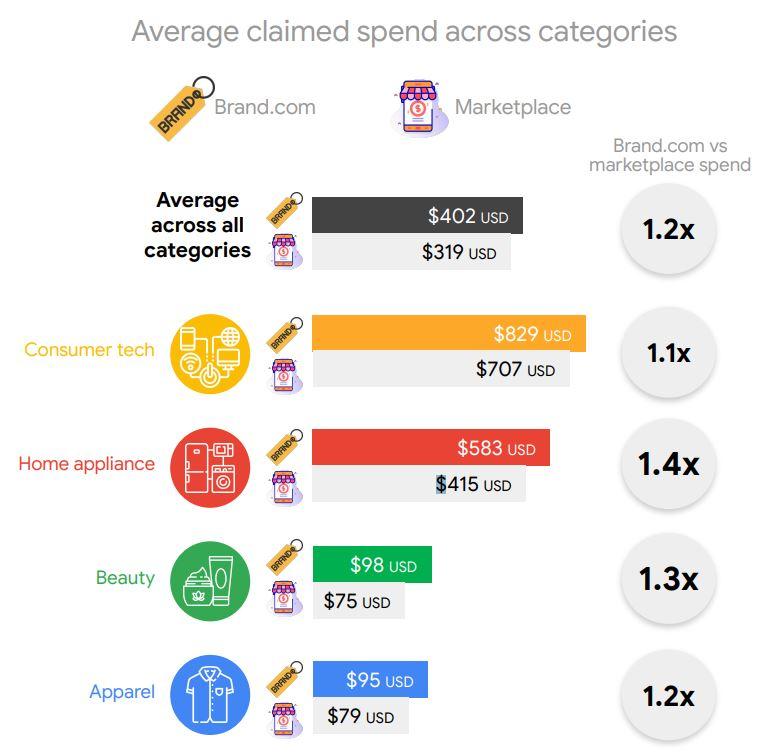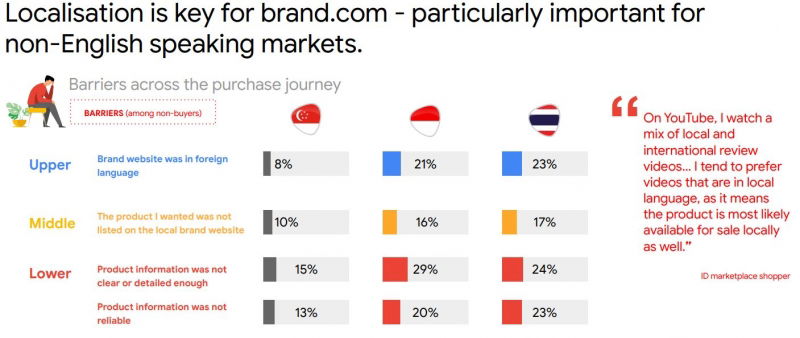
Study: SEA consumers trust brand websites over marketplaces
share on
Consumers in Southeast Asia are willing to spend 20% more on an average order when they are making purchases on the brand's website directly as compared to marketplaces, said a report done by Google and market research companies Ipsos and Sixth Factor. This is because shoppers are more assured that the product they receive from the brand's own website is more authentic. They are also comforted by the idea that if issues emerge, they can return to the official seller for warranty and after-sales services. As such, they are willing to pay a premium on products sold on the brand's website itself.
The study also found that shoppers are enticed to make purchases on brand websites that offers extended warranty, or looser terms for refunds or exchanges (such as allowed exchanges of opened products that are still in good condition). This is especially so for high investment products.
Another reason why consumers turn to brand websites for purchase is because brand websites can deliver an immersive, experiential shopping, as well as a complete shopping experience. One aspect that shoppers look forward to when purchasing on a brand website is clear product specs presented via photos and videos. Google's study added that for brands to have that immersive experience on its website, there needs to be engaging content that can come in the form of animations, professionally shot images, and 360 degree view of product. This adds to the positive brand image.
Brands can also elevate influence in the decision-making process of consumers with Google and YouTube by providing authenticity and immersive experience needs. According to the report, some surveyed consumers said they would turn to Google for reviews or to understand product specs better. They also watch YouTube videos to get a better sense of the product design, colour, touch, and feel.

However, that is not to say that brands should not invest in marketplaces. The study found although 55% of shoppers surveyed use a brand’s website at some stage during their path to purchase, price-sensitive shoppers still prefer to make their purchases on marketplaces because of special deals or discounts. These promotions are often rated as the top reason why consumers choose to shop on marketplaces over a brand website.
Marketplaces can also offer brands an opportunity to reach a variety of shoppers. The study suggests that brands should utilise its flagship store on marketplaces as 51% of shoppers do purchase from brand flagship stores within marketplaces. This is a clear indication that consumers tend to look for signs of a brand’s official presence on marketplace, offering a voice of authenticity and credibility. However, continual investment into official brand websites are still required as there is higher trust with brand websites, the report added.
As such, brands and marketplaces can coexist in the online retail ecosystem and do not need to compete with each other as each have unique offerings.
While brand websites should not be neglected, partnerships with marketplaces can be strengthened to capture more shoppers across the purchase pathway.
Localisation is key
When it comes to brand websites, the study also showed that consumers want localised content, from ensuring promotional content is in a language they are familiar with, to being able to find and buy products they have viewed online via local brand websites.
For non-English speaking markets, local-language options can contribute to a greater sense of trust and reliability. The report found that a key barrier for non-buyers to discover more about products was that a brand website was in a foreign language, making it difficult for shoppers to learn more about a product or delivery options.
At the same time, localisation also ensures products available in-market are listed online (not just found in-store), while providing local warranties for people purchasing from overseas retailers can also help instill confidence in your brand.

Through brand websites, brands are building a first-party data ecosystem, which can help personalise and localise the experience shoppers crave. By engaging the right customers and finding ways to continually connect with them, brands are future-proofing their brand and ensuring long-term value.
Google also said it is critical for brands to fully invest in a balanced digital presence that includes their brand website. Shoppers want to be able to discover, research, evaluate their options, and make their purchase seamlessly. And brand websites play a crucial role throughout these consumer journeys. For online retail success, Google said owning and building customer relationships through brand websites will be key to the future growth of business.
MARKETING-INTERACTIVE's Content 360 Week is back from 6 to 8 April this year! Super charge your content production, distribution and monetisation strategies by learning from brands such as NBA Asia, P&G, Malaysia Airlines, and Marriott International, among others. Sign up today!
Related Articles:
After Google, News Corp strikes 3-year deal with Facebook for news
Analysis: Google’s privacy promise is great for consumers, but what about SMEs?
Analysis: Will Google's FLoC proposal be yet another walled garden?
share on
Free newsletter
Get the daily lowdown on Asia's top marketing stories.
We break down the big and messy topics of the day so you're updated on the most important developments in Asia's marketing development – for free.
subscribe now open in new window
